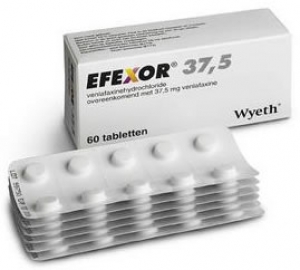Top Class Actions’s website and social media posts use affiliate links. If you make a purchase using such links, we may receive a commission, but it will not result in any additional charges to you. Please review our Affiliate Link Disclosure for more information.

Plaintiffs Janet Lee and Jeffery Lynn Wheeler’s son was born with multiple birth defects, which the couple alleges was directly caused by the minor’s mother from ingesting the defendant’s antidepressant Effexor during her pregnancy.
The minor plaintiff was born on Dec. 14, 2011 with multiple birth defects, including Tetraology Fallot, and had to be hospitalized for this and other medical conditions.
According to the Effexor lawsuit, Janet had been diagnosed with depression and was prescribed Effexor by her physician, and had been unaware of any risks the drug may have carried for any future pregnancies.
Allegedly as a consequence of the defendants’ negligence regarding Effexor’s warning label, the minor plaintiff will have to live with life-long complications and be permanently impaired by his disabilities.
The parents state that it has been a struggle to keep up with their son’s needs and the medical bills that come with it. Janet insists that neither she nor her husband had been told of the possibility of Effexor birth defects, and state that their physician had no knowledge of these Effexor side effects either.
Janet stated in her Effexor lawsuit that she never would have taken Effexor if she had known it would be a risk to her unborn son, and sticks to the claim currently.
The couple is filing this Effexor lawsuit after learning that Effexor and other related medications are being investigated for allegedly being the cause of numerous birth defects in children.
Their Effexor lawsuit is joining multidistrict litigation (MDL) No. 2458, centered in eastern Pennsylvania, where it will stand alongside other injury claims that claim similar damages.
The couple’s attorneys, as well as many others in the MDL, state that Pfizer and Wyeth had the civil responsibility of warning their customers of all the risks their products carry. Wheeler and many other women were relying on the accuracy of the given information on the drug’s label, and had no reason to doubt that the information was incomplete or had certain parts omitted.
This Effexor Birth Defect Lawsuit is Janet Lee Wheeler and Jeffery Lynn Wheeler v. Wyeth Pharmaceuticals, MDL No. 2458, in the U.S. District Court for the Eastern District of Pennsylvania.
Overview of Effexor Birth Defect Complications
Effexor (Venlafaxine) was first released in 1993 to treat major depression disorders in adult patients.
Due to the marketing efforts of Pfizer and Wyeth, Effexor became the sixth most popular drug in America in 2007, with over 17.2 million prescriptions. Part of the appeal Pfizer and Wyeth emphasized with Effexor, was that it was a part of the serotonin and norepinephrine reuptake inhibitor (SNRI) family.
This class of medication is well-known for its members being successful antidepressants, having an established popularity among doctors and patients alike. SNRIs increases the concentration levels of the brain’s neurotransmitters, which would ideally allow patients a reasonable level of control of their moods.
Effexor is considered an aggressive medication that is prone to having patients suffer side effects, so it is typically reserved as an alternative medication because the changes to the patient’s body are so sudden. These side effects include: nausea, headache, insomnia, drowsiness, dry mouth, and other physical impairments.
However, the Effexor side effect that has been gaining the most attention has been the alleged birth defects that have allegedly occurred in unborn babies, after the mother ingested Effexor or other SNRI medications during pregnancy.
The birth defects reported have ranged from a cleft palate to septal defects or “holes in the heart.”
Ever since these allegations appeared, numerous studies have been conducted to observe this correlation, with scientists finding an increased likelihood in patients who had taken either SNRI or SSRI (selective serotonin reuptake inhibitor) medications.
In general, birth defect lawsuits are filed individually by each plaintiff and are not class actions.
Do YOU have a legal claim? Fill out the form on this page now for a free, immediate, and confidential case evaluation. The attorneys who work with Top Class Actions will contact you if you qualify to let you know if an individual lawsuit or class action lawsuit is best for you. Hurry — statutes of limitations may apply.
ATTORNEY ADVERTISING
Top Class Actions is a Proud Member of the American Bar Association
LEGAL INFORMATION IS NOT LEGAL ADVICE
Top Class Actions Legal Statement
©2008 – 2024 Top Class Actions® LLC
Various Trademarks held by their respective owners
This website is not intended for viewing or usage by European Union citizens.
Get Help – It’s Free
Join a Free Birth Defect Lawsuit Investigation
If you or a loved one took Zoloft, Prozac, Lexapro, Effexor, Celexa, Cymbalta or Depakote during pregnancy and gave birth to a child with a congenital defect, you may have a legal claim against the drug’s manufacturer. Find out if you qualify to pursue compensation for your child’s medical expenses, pain and suffering, and other damages by filling out the form below now.
An attorney will contact you if you qualify to discuss the details of your potential case.
Oops! We could not locate your form.












